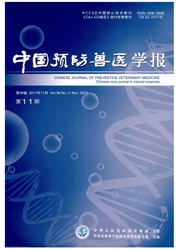

 中文摘要:
中文摘要:
对243株禽源大肠杆菌分离株进行血清耐受试验、菌毛化大肠杆菌血凝试验和温度敏感性血凝素试验,在这些分离株中,高度血清耐受、中等血清耐受、轻度血清耐受和血清敏感菌株分别占受试菌株的57.2%(139/243)、28.8%(70/243)、10.3%(25/243)和3.7%(9/243)。在37℃细菌培养物与鸡红细胞凝集试验中,甘露糖敏感血凝(MSHA)和甘露糖耐受血凝(MRHA)菌株分别占受试菌株的64.6%(157/243)和5.8%(14/243);与豚鼠红细胞凝集试验中,MSHA和MRHA菌株分别占受试菌株的74.9%(182/243)和2.9%(7/243),其中与鸡红细胞凝集试验MSHA菌株中,MSHA阳性菌株占高致病株的69.5%(132/190),MRHA阳性菌株占低致病株的22.2%(2/9),两者差异极显著(p〈0.01)。在温度敏感性血凝素试验中,MRHA菌株为112株,占分离株的46.1%,其中01、02和078血清型的高致病株占所在血清型分离株的83%~100%,而其它血清型的高致病株仅占57%左右,差异显著(p〈0.05)。结果显示禽源大肠杆菌的致病性与其血清耐受能力、鸡红细胞MSHA菌毛的表达和温度敏感性血凝素的表达呈一定的相关关系。
 英文摘要:
英文摘要:
Avian E.coli isolates in China were characterized for serum resistance, mannose sensitive/resistant hemagglutinatin and temperature-sensitive hemagglutinin. Among 243 isolates tested, 57.2 % (139), 28.8 % (70), 10.3 % (25) and 3.7 % (9) of the strains were shown resistant, intermediate resistant, low resistant and sensitive to SPF chicken sera, respectively. At 37℃, 64.6 % (157) of the strains showed mannose sensitive hemagglutination (MSHA) and 5.8 % (14) mannose resistant hemagglutination (MRHA) with chicken erythrocytes, while 74.9 % (182) of strains showed MSHA and 2.9% (7) MRHA with guinea pigs erythrocytes. However 46.1% (112) strains showed MRHA of chicken erythrocytes when cultured at 26℃. Of those with temperature-sensitive hemagglutinin (Tsh), 83 % to 100 % isolates belonged to the high pathogenic O1, O2 or O78 serogroups. The high prevalence of resistance to chicken sere, fimbriae F1, temperature-sensitive hemagglutinin in high pathogenic isolates suggested importance of these phenotypes in the pathogenesis of colibacillosis.
 同期刊论文项目
同期刊论文项目
 同项目期刊论文
同项目期刊论文
 Prevalence of Virulence Factors and Antimicrobial Resistance of Uropathogenic Escherichia coli in Ji
Prevalence of Virulence Factors and Antimicrobial Resistance of Uropathogenic Escherichia coli in Ji 期刊信息
期刊信息
